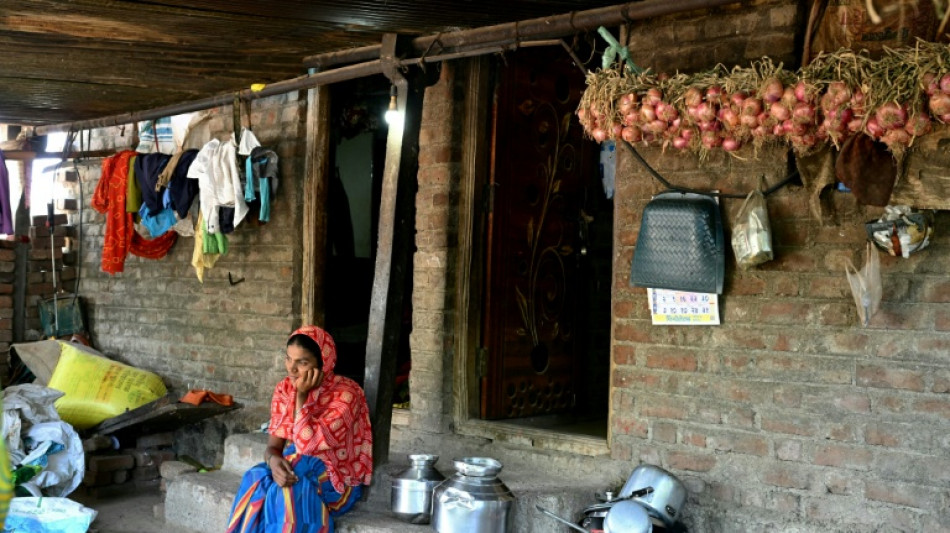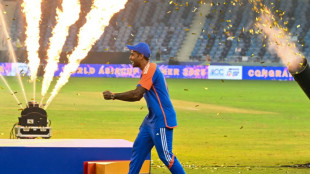
-
 Moldova's pro-EU party hails poll win despite 'dirty' Russian tactics
Moldova's pro-EU party hails poll win despite 'dirty' Russian tactics
-
Typhoon Bualoi kills dozens in Vietnam and Philippines

-
 Wallabies' big-man Skelton ready to impose himself against All Blacks
Wallabies' big-man Skelton ready to impose himself against All Blacks
-
Robertson wants All Blacks to 'pressure' Wallabies in rematch

-
 Sinner cruises into China Open semi-finals as Swiatek moves on
Sinner cruises into China Open semi-finals as Swiatek moves on
-
GSK switches CEO as Trump tariffs test pharma

-
 Trump to push Netanyahu on Gaza peace plan at White House
Trump to push Netanyahu on Gaza peace plan at White House
-
Most markets track Wall St gains after US inflation data

-
 Typhoon Bualoi batters Vietnam coast, killing 11
Typhoon Bualoi batters Vietnam coast, killing 11
-
Germany's Lufthansa to slash 4,000 jobs by 2030

-
 Moldova's pro-EU party wins key polls after Russian meddling claims
Moldova's pro-EU party wins key polls after Russian meddling claims
-
Mourinho Chelsea return prompts old memories, mixed feelings

-
 'Predators': how reality TV explains Epstein obsession
'Predators': how reality TV explains Epstein obsession
-
Most Asian markets track Wall St higher after US inflation data

-
 India, Pakistan trade accusations after Asia Cup trophy debacle
India, Pakistan trade accusations after Asia Cup trophy debacle
-
Power-packed Australia favourites to rewrite World Cup history

-
 Latin artist Bad Bunny to headline Super Bowl half-time show
Latin artist Bad Bunny to headline Super Bowl half-time show
-
Air France, Airbus back on trial over doomed 2009 Rio flight

-
 India's divine designs meld with AI at Durga Puja festival
India's divine designs meld with AI at Durga Puja festival
-
Donald won't rule out Ryder Cup captain return after Europe win

-
 Who is Matthieu Blazy, the new man at Chanel?
Who is Matthieu Blazy, the new man at Chanel?
-
'New chapter': Paris Fashion Week to showcase industry makeover

-
 Bradley on US Ryder Cup loss: 'This is no one's fault but mine'
Bradley on US Ryder Cup loss: 'This is no one's fault but mine'
-
Four killed in attack on northern US Mormon church

-
 Bradley calls for Ryder Cup rule change for injuries
Bradley calls for Ryder Cup rule change for injuries
-
McIlroy slams 'unacceptable' Ryder Cup heckling

-
 Embattled Australia telco giant hit by another major outage
Embattled Australia telco giant hit by another major outage
-
31 Concept Accelerates Next-Gen DPI Leadership With Strategic Acquisition of Xynthor AI

-
 Mahomes leads resurgent Chiefs in Ravens rout, Eagles stay unbeaten
Mahomes leads resurgent Chiefs in Ravens rout, Eagles stay unbeaten
-
Moldova's pro-EU party tops polls hit by Russian meddling claims

-
 Europe win emotional Ryder Cup triumph after US fightback
Europe win emotional Ryder Cup triumph after US fightback
-
Two dead after shooting, fire at US Mormon church

-
 Europe must step up efforts to protect environment: report
Europe must step up efforts to protect environment: report
-
Eagles down Bucs to stay unbeaten, Bills march on

-
 Incumbent absent as Cameroon presidential campaigning picks up
Incumbent absent as Cameroon presidential campaigning picks up
-
AC Milan beat champions Napoli to make Serie A title statement

-
 Scores arrested on second day of Morocco protests: NGO
Scores arrested on second day of Morocco protests: NGO
-
'One Battle After Another' debuts top of N. America box office

-
 Two dead after US shooting, fire at Mormon church
Two dead after US shooting, fire at Mormon church
-
Mitchell open to coaching first Women's Lions in 2027

-
 Vagnoman sends Stuttgart past Cologne in Bundesliga
Vagnoman sends Stuttgart past Cologne in Bundesliga
-
Stars turn out for Armani's final collection in Milan

-
 Massive Russian drone and missile attack kills four in Kyiv
Massive Russian drone and missile attack kills four in Kyiv
-
Arsenal showed 'ambition' of title winners in Newcastle win: Arteta

-
 Free Picasso park to open in Paris in 2030
Free Picasso park to open in Paris in 2030
-
Barca beat Real Sociedad to top Liga as Yamal returns

-
 Arsenal strike late for 'beautiful' Newcastle win, close in on Liverpool
Arsenal strike late for 'beautiful' Newcastle win, close in on Liverpool
-
Barca beat Real Sociedad to go top as Yamal returns

-
 Kildunne says 'no reason' England can't win Rugby World Cup again
Kildunne says 'no reason' England can't win Rugby World Cup again
-
Arsenal strike late to beat Newcastle, close in on Liverpool


Climate change heightens risk of Indian farmer suicides
On a small farm in India's Maharashtra state, Mirabai Khindkar said the only thing her land grew was debt, after crops failed in drought and her husband killed himself.
Farmer suicides have a long history in India, where many are one crop failure away from disaster, but extreme weather caused by climate change is adding fresh pressure.
Dwindling yields due to water shortages, floods, rising temperatures and erratic rainfall, coupled with crippling debt, have taken a heavy toll on a sector that employs 45 percent of India's 1.4 billion people.
Mirabhai's husband Amol was left with debts to loan sharks worth hundreds of times their farm's annual income, after the three-acre (one-hectare) soybean, millet and cotton plot withered in scorching heat.
He swallowed poison last year.
"When he was in the hospital, I prayed to all the gods to save him," said 30-year-old Mirabai, her voice breaking.
Amol died a week later, leaving behind Mirabai and three children. Her last conversation with him was about debt.
Their personal tragedy is replicated daily across Marathwada, a region in Maharashtra of 18 million, once known for fertile farmland.
Last year, extreme weather events across India affected 3.2 million hectares (7.9 million acres) of cropland -- an area bigger than Belgium -- according to the New Delhi-based Centre for Science and Environment research group.
Over 60 percent of that was in Maharashtra.
"Summers are extreme, and even if we do what is necessary, the yield is not enough," said Amol's brother and fellow farmer Balaji Khindkar.
"There is not enough water to irrigate the fields. It doesn't rain properly."
- 'Increase the risks' -
Between 2022 and 2024, 3,090 farmers took their own lives in Marathwada, an average of nearly three a day, according to India's Minister of Agriculture Shivraj Singh Chouhan.
Government statistics do not specify what drove the farmers to kill themselves, but analysts point to several likely factors.
"Farmer suicides in India are a consequence of the crisis of incomes, investment and productivity that you have in agriculture," said R. Ramakumar, professor of development studies at the Tata Institute of Social Sciences.
Farming across many Indian smallholdings is done largely as it has been for centuries, and is highly dependent on the right weather at the correct time.
"What climate change and its vulnerabilities and variabilities have done is to increase the risks in farming," Ramakumar said.
This "is leading to crop failures, uncertainties... which is further weakening the economics of cultivation for small and marginal farmers."
The government could support farmers with better insurance schemes to cope with extreme weather events, as well as investments in agricultural research, Ramakumar said.
"Agriculture should not be a gamble with the monsoon."
- 'Make ends meet' -
Faced with uncertain weather, farmers often look to stem falling yields by investing in fertilisers or irrigation systems.
But banks can be reluctant to offer credit to such uncertain borrowers.
Some turn to loan sharks offering quick cash at exorbitant interest rates, and risking catastrophe if crops fail.
"It is difficult to make ends meet with just farming," Mirabai said, standing outside her home, a tin-roofed hut with patch-cloth walls.
Her husband's loans soared to over $8,000, a huge sum in India, where the average monthly income of a farming household is around $120.
Mirabai works on other farms as a labourer but could not pay back the debt.
"The loan instalments piled up," she said, adding that she wants her children to find jobs outside of farming when they grow up.
"Nothing comes out of the farm."
The agricultural industry has been in a persistent crisis for decades.
And while Maharashtra has some of the highest suicide rates, the problem is nationwide.
Thirty people in the farming sector killed themselves every day in 2022, according to national crime records bureau statistics.
At another farm in Marathwada, 32-year-old farmer Shaikh Imran took over the running of the family smallholding last year after his brother took his own life.
He is already more than $1,100 in debt after borrowing to plant soybean.
The crop failed.
Meanwhile, the pop of explosives echoes around as farmers blast wells, hoping to hit water.
"There's no water to drink," said family matriarch Khatijabi. "Where shall we get water to irrigate the farm?"
B.Wyler--VB
